June 19th, 2006
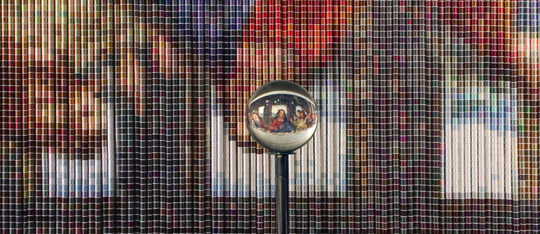 Â
Â
Dr. Lynette Davidson writes a great article, What do Templars, the Jesus Family and DaVinci have to do with Nazis?, about how bad history, even fictionalized, has real consequences.
But do Knight’s Templar, as seen in their heyday and in the 1930’s, suffer?
 Â Â Â Â
    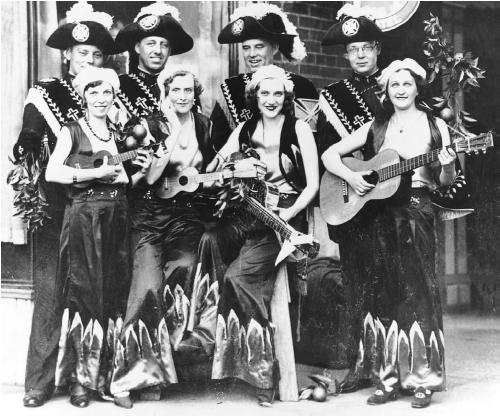
Does DaVinci’s Last Supper suffer from being repainted, or from modern interpretations? The artwork at the top is
“A life sized rendering of Leonardo da Vinci’s The Last Supper constructed from 20,736 spools of thread strung onto aluminum ball chain. When seen with the aid of optical devices, the spools of thread coalesce into realistic images of Christ and his disciples.”
Below is the repaired version along with a detail showing before and after of JohnMary. The third picture is an ad showing a sacred feminine version that was banned in Milan.
 Â Â
  

As for albinos, Karen Jordan, Lexi’s mom, says this about the stereotypical depiction of albinos in books and movies:
One more evil albino makes things just a little harder for my daughter and many others.

Incidentally, athough albinos usually do have some vision impairment, their eyes are only red, like everyone else’s, in flash pictures.
Posted in Art, Books, Photography & Multimedia, Politics | 238 Comments »
June 9th, 2006
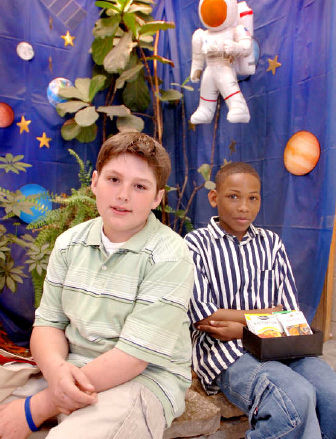 Â Â Â Â
      Â
 Â
Fifth graders Billy Shannon and Cameron Wade got to attend the NASA rocket launch which had their own experiments aboard, thanks in a very teensy part to my financial contribution on bablog. Today most experiments involve Menthos and Diet Coke, but here is what the elementary school students did:
The students placed nuts and bolts screwed together in tiny bottles to see whether the vibrations from the rocket will break them apart. They also sent up plant seeds, which they will plant this summer along with seeds that haven’t been airborne to see whether there is a difference in growth.
As a former seventh grade Bronx county Science Fair winner for my project “How does a Photoelectric Cell Convert Light Energy into Electrical Energy” – which provided me the opportunity to participate in the (alas discontinued) Florida Science Study Program – I know personally how important such an experience can be to a young student/scientist.
Update, thanks to Phil.
Posted in Math & Science | 772 Comments »
June 6th, 2006
 Â Â Â Â
    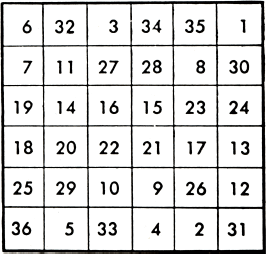    Â
    
Hexakosioihexekontahexaphobia is the fear that 666 is the number of the Devil. Aside Revelations 13, there are some peculiar theories as to the origin of the number. June 6, 1666 was a good day for that old time blogger, Samuel Pepys, because of English victories at sea over the Dutch. In part he wrote:
Up betimes, and vexed with my people for having a key taken out of the chamber doors and nobody knew where it was, as also with my boy for not being ready as soon as I, though I called him, whereupon I boxed him soundly, and then to my business at the office and on the Victualling Office, and thence by water to St. James’s, whither he [the Duke of York] is now gone, it being a monthly fast-day for the plague. … Mightily pleased with this happy day’s newes, and the more, because confirmed by Sir Daniel Harvy, who was in the whole fight with the Generall, and tells me that there appear but thirty-six in all of the Dutch fleete left at the end of the voyage when they run home. The joy of the City was this night exceeding great.
September 2 that year was a bad day, as the Great Fire of 1666 burned down medieval London.  Pepys wrote:
Spirals of great fire and flame lept forth from every chimney and London was left but a ruin.
The fire smoldered until March of 1667.  On the bright side, the Great Fire did end the previous year’s plague and made way for the great architectural works of Christopher Wren.
Speaking of fire and history, today is the aniversary of D-Day, “The End of the Beginning” of Hitler’s Nazis, in 1944, and the shooting of James Meredith, the first black man to attend the University of Mississippi, in 1966.
 Â Â Â Â
        Â
    
Posted in Books, Math & Science, Photography & Multimedia, Travel | 61 Comments »
June 2nd, 2006

Guess which book I’m reading! There is a lot of mumbo jumbo about the golden ratio (Φ) in the book, so I think it is interesting that the Mona Lisa hanging in the Louvre is ~4% too wide in aspect – compare first Mona above to “Φ ratio-ed” second. The third Mona is a contempory’s copy of the original, showing the original original may have been wider yet – note columns on sides - a full ~31% too wide for Φ.
The three Mona Lisa variations to the right of the pentagram are: Dali’s self-portrait, my favorite – check out the 30(?) pieces of silver he/she is holding in his/her hand;  MAD Magazine cover art;  and an eye test. Can you see what’s wrong with the last Mona, aside from the obvious?
Posted in Art, Books, Math & Science | 65 Comments »
May 26th, 2006


Just deciphered the UPC code in the 42 Puzzle. PANIC!

Posted in Games, Humor | 19 Comments »
May 25th, 2006
Posted in Books | 13 Comments »
May 13th, 2006
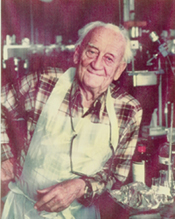 Â
Â
If you translate orgona from Hungarian to English you might expect organ, but it translates to lilac. Similarly, himnusz isn’t hymn but National Anthem. Such words are called false friends.Â
There are only a few words in English that derive from Hungarian. They include paprika, which has the highest concentration per weight of vitamin C of any food (in fact, vitamin C was first isolated in paprika and named “ascorbic acid” meaning “the acid that prevents scurvy” by Albert Szent-Györgyi – for which he won a Nobel prize); and coach – derived from kocsi, “car” in Hungarian - literally “from the town of Kocs” where in Medieval times coaches were made.
But there are a number of Hungarian-English false friends.  For example, the English headline:
Act Reclaims Farmer’s Smoking Combine
might be an analog to the Hungarian headline:
Akt Reklam: Farmer, Szmoking, Kombine
which, since each word is a false friend, unexpectedly translates to:
Ad for a Nude: Blue Jeans, Tuxedo, Lingerie
The most famous Hungarian-English false friends aren’t found in Peter Lazar’s list. They are some of George Carlin‘s seven dirty words – verbatum transcript prepared by the FCC.
Here’s some good eats with plenty of Hungarian paprika from János Mohácsi.

Posted in Food, Humor | 355 Comments »
May 5th, 2006

In 1862 President Benito Juarez ordered Mexico‘s army, under General Ignacio Zaragoza, to defend the nation against French invaders. The army, consisting of ill-equiped soldier-indians, met and defeated Napolian’s powerful European army at the Battle of Puebla. May five – Cinco de Mayo – is a celebration of the great victory. Alan and Lia party and parade to mark the holiday. They are cooking traditional Mexican tripe soup, menudo.


Posted in Family & Friends, Food, Games | 17 Comments »
























